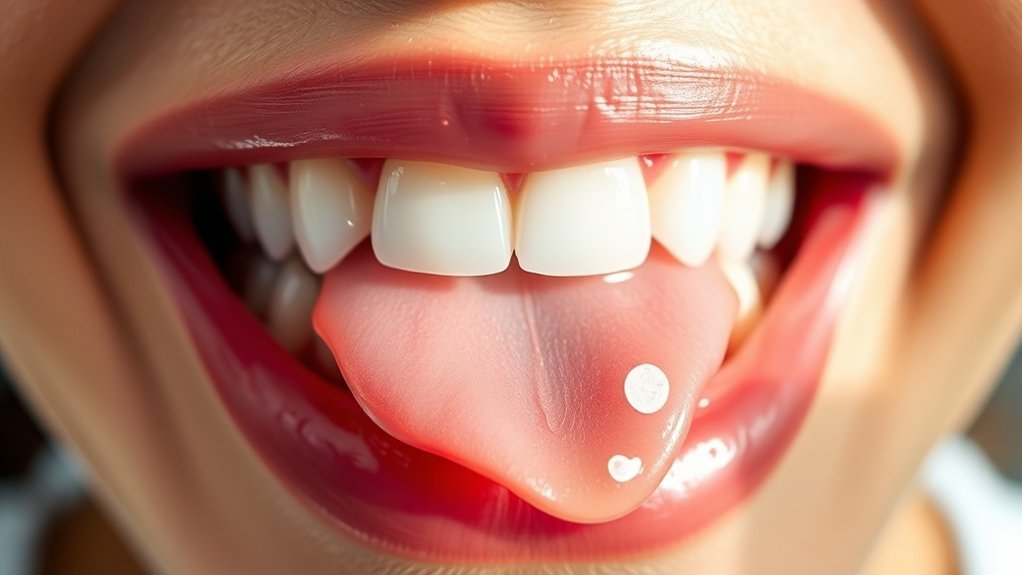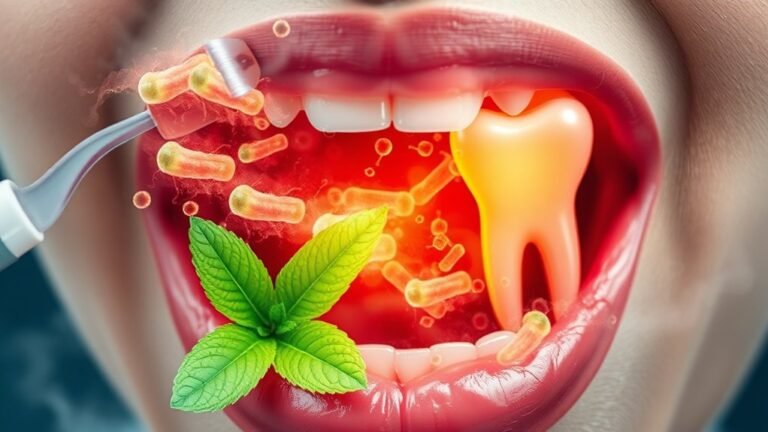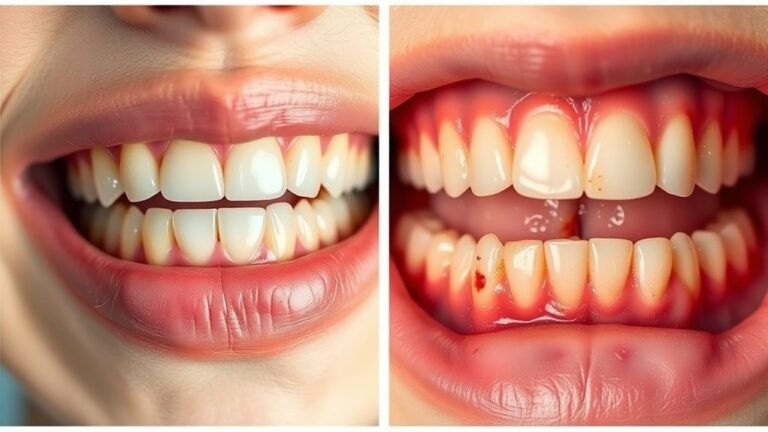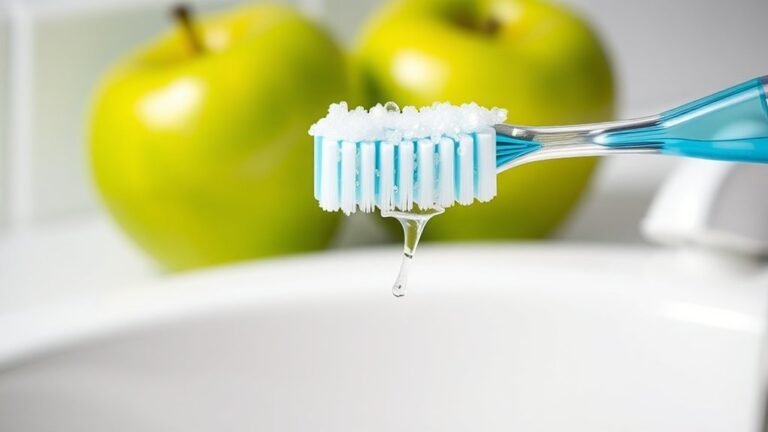Maintaining Saliva Flow Supports Microbial Balance and Oral Health
Maintaining saliva flow is essential for your oral health and microbial balance. Saliva neutralizes acids, washes away food particles, and protects against harmful bacteria. When your saliva flow decreases, you risk dry mouth, which can lead to tooth decay, gum disease, and discomfort. Simple practices like staying hydrated, chewing sugar-free gum, and eating crunchy fruits can enhance saliva production. Understanding these strategies can greatly improve your oral well-being and overall health. Learn more about the impact of saliva on your oral health.
Key Takeaways
- Adequate saliva flow washes away food particles and neutralizes harmful acids, promoting a healthy oral environment.
- Saliva contains antimicrobial properties that inhibit harmful bacteria and support beneficial microbial populations.
- A balanced microbial environment reduces the risk of cavities, gum disease, and infections in the mouth.
- Regular hydration and specific foods can enhance saliva production, maintaining oral health and microbial diversity.
- Identifying and addressing causes of reduced saliva flow is essential for preventing serious dental issues.
The Role of Saliva in Oral Health
Saliva plays an essential role in maintaining oral health, as it not only aids in digestion but also protects your teeth and gums. Adequate saliva flow is critical for washing away food particles and neutralizing acids produced by bacteria, which helps prevent tooth decay and gum disease. A balanced oral microbiome relies on consistent saliva production; it contains antimicrobial properties that inhibit harmful bacteria while promoting beneficial microbes. When saliva flow decreases, you may experience dry mouth, leading to an imbalance in your oral microbiome, which can compromise your oral health. Consequently, maintaining ideal saliva flow is essential for preserving your teeth and gums and ensuring a healthy environment in your mouth. Prioritizing hydration and oral care can help achieve this balance.
Understanding the Composition of Saliva
The intricate balance of oral health relies on the unique composition of saliva, which consists of water, electrolytes, mucus, enzymes, and antimicrobial compounds. Each component plays a significant role in maintaining microbial balance within your mouth. For instance, mucus helps in lubricating and protecting oral tissues while enzymes break down food particles and inhibit harmful bacteria. Antimicrobial compounds are essential for infection prevention, as they neutralize pathogens and support mucosal immunity. This immune response is crucial for controlling the growth of potentially harmful microorganisms, ensuring that your oral environment remains healthy. By understanding these elements, you can appreciate how saliva contributes to overall oral health and why maintaining its flow is so important.
How Saliva Affects Microbial Balance
Saliva plays an essential role in maintaining the microbial balance in your mouth by providing fundamental nutrients and creating an environment that supports healthy bacteria. This microbial diversity is important for preventing infections and maintaining overall oral health. Additionally, saliva helps regulate pH levels, further promoting a balanced ecosystem that protects against harmful pathogens.
Role of Saliva
A healthy balance of oral microbes is essential for maintaining overall oral health, and saliva plays an important role in achieving this equilibrium. Salivary glands produce saliva, which contributes to microbial balance in several ways:
- Washing Away Debris: Saliva helps to clear food particles and bacteria from your mouth.
- Buffering Acidity: It neutralizes acids produced by bacteria, preventing tooth decay.
- Antimicrobial Properties: Saliva contains proteins and enzymes that inhibit harmful bacteria.
- Nutrient Supply: It provides essential nutrients that support beneficial microbial growth.
- Hydration: Adequate saliva flow keeps your oral tissues moist, promoting a healthy environment.
Microbial Diversity Importance
Maintaining a diverse microbial community in your mouth is essential for overall oral health. Saliva plays a fundamental role in fostering this diversity, as it contains proteins and enzymes that support beneficial bacteria while inhibiting harmful ones. A balanced microbial environment helps prevent oral diseases, promotes effective digestion, and enhances immune response.
| Microbial Type | Benefits | Impact of Saliva |
|---|---|---|
| Beneficial Bacteria | Prevents plaque formation | Stimulates growth |
| Pathogenic Bacteria | Causes cavities & gum disease | Suppressed by saliva |
| Fungi | Can lead to infections | Balanced by saliva |
| Viruses | May cause oral lesions | Cleared by saliva |
| Archaea | Role in oral health balance | Supported by saliva |
Saliva and Ph Balance
When the pH level in your mouth is balanced, it creates an environment conducive to the thriving of beneficial bacteria while discouraging harmful pathogens. Saliva plays a vital role in maintaining this balance through various mechanisms, including:
- Neutralizing acids produced by food and bacteria
- Providing minerals like calcium and phosphate to strengthen enamel
- Facilitating digestion by breaking down food particles
- Washing away food debris and harmful substances
- Supporting the immune system with antimicrobial proteins
Common Causes of Reduced Saliva Flow
Reduced saliva flow can stem from several common factors, including medication side effects, dehydration, and certain health conditions. Medications, particularly those for allergies or high blood pressure, may hinder your body’s ability to produce saliva. Understanding these causes can help you take proactive steps to maintain your oral health.
Medication Side Effects
Many medications, particularly those for anxiety, depression, allergies, and high blood pressure, can considerably impact your saliva flow. Reduced saliva can lead to discomfort and increase your risk of dental issues. It’s important to be aware of the common medications that can contribute to this side effect:
- Antidepressants (SSRIs and SNRIs)
- Antihistamines (for allergies)
- Diuretics (for high blood pressure)
- Muscle relaxants
- Pain relievers (opioids)
If you notice a decrease in saliva flow after starting a new medication, consult your healthcare provider. They can help you explore alternatives or adjust your dosage to mitigate the side effects while ensuring your overall health remains a priority. Staying informed empowers you to advocate for your oral health.
Dehydration Factors
Dehydration can considerably diminish saliva production, leading to discomfort and potential oral health issues. Several factors contribute to dehydration, including insufficient fluid intake, excessive physical activity, and environmental conditions like heat and humidity. When you don’t drink enough water throughout the day, your body prioritizes essential functions, often reducing saliva flow. Additionally, consuming diuretics such as caffeine or alcohol can exacerbate dehydration by increasing urine output. Certain diets low in water-rich foods can also lead to decreased hydration levels. Finally, prolonged exposure to air conditioning or heated environments can further dry out your mouth. Recognizing these factors can help you take proactive steps to maintain adequate hydration and support your oral health.
Health Conditions
Certain health conditions can markedly impact saliva production, leading to discomfort and increased risk of oral health problems. Understanding these conditions can help you manage your oral health more effectively. Here are some common causes of reduced saliva flow:
- Medications: Many prescriptions, especially antidepressants and antihistamines, can dry out your mouth.
- Autoimmune diseases: Conditions like Sjögren’s syndrome can directly affect saliva glands.
- Diabetes: This chronic condition can lead to dehydration and reduced saliva production.
- Radiation therapy: Treatments for head and neck cancers often damage saliva glands.
- Nerve damage: Injuries or conditions affecting the nerves in your head and neck can impair saliva production.
Awareness of these issues is essential for maintaining ideal oral health.
The Impact of Dry Mouth on Oral Health
When you experience dry mouth, the consequences for your oral health can be significant. Saliva plays an important role in neutralizing acids, washing away food particles, and controlling harmful bacteria. Without adequate saliva, you may face an increased risk of cavities, gum disease, and bad breath. The lack of moisture can lead to discomfort, making chewing and swallowing difficult. Additionally, dry mouth can affect your taste perception, diminishing your enjoyment of food. Over time, the imbalance in oral bacteria can contribute to infections and other serious dental issues. It’s essential to recognize these risks and take proactive steps to protect your oral health and maintain a balanced microbial environment in your mouth.
Simple Practices to Enhance Saliva Production
Have you ever wondered how simple lifestyle changes can boost your saliva production? Enhancing saliva flow is easier than you think. Here are some effective practices you can incorporate into your daily routine:
- Stay Hydrated: Drink plenty of water throughout the day to keep your body and mouth hydrated.
- Chew Gum: Opt for sugar-free gum to stimulate your salivary glands and promote saliva flow.
- Breathe Through Your Nose: This helps maintain moisture in your mouth and encourages saliva production.
- Practice Good Oral Hygiene: Regular brushing and flossing can improve overall oral health and stimulate saliva.
- Limit Caffeine: Reduce consumption of caffeinated beverages, as they can contribute to dry mouth.
Implementing these practices can greatly improve your saliva production and support your oral health.
Foods and Beverages That Stimulate Saliva Flow
Incorporating specific foods and beverages into your diet can considerably enhance saliva flow and improve oral health. Foods rich in fiber, acidity, and crunchiness can stimulate your salivary glands, promoting a healthy oral environment. Here’s a quick reference table to guide you:
| Food/Beverage | Saliva-Stimulating Properties | Tips for Consumption |
|---|---|---|
| Citrus Fruits | High acidity | Enjoy as a snack or juice |
| Apples | Crunchy texture | Slice and eat raw |
| Carrots | Crunchy texture | Snack on them raw |
| Yogurt | Probiotics | Incorporate into meals |
| Mint Tea | Invigorating and aromatic | Sip throughout the day |
Incorporate these items into your meals for ideal oral health.
When to Seek Professional Help for Saliva Issues
While most people experience occasional dry mouth, persistent saliva issues can signal underlying health problems that shouldn’t be ignored. If you’re facing ongoing saliva concerns, it’s essential to consult a healthcare professional. Consider seeking help if you experience:
- Chronic dry mouth that affects daily activities
- Difficulty swallowing or speaking
- Increased tooth decay or gum disease
- Bad breath that doesn’t improve with oral hygiene
- Changes in taste perception
Addressing these symptoms early can help prevent more severe complications. A healthcare provider can diagnose potential underlying conditions, recommend treatments, and suggest lifestyle changes to restore your saliva flow and improve your oral health. Don’t hesitate to take action for your well-being.
Frequently Asked Questions
Can Medications Affect Saliva Production and Oral Health?
Yes, medications can markedly affect saliva production, leading to dry mouth. This condition can increase the risk of cavities and gum disease, so it’s essential to discuss any concerns with your healthcare provider for appropriate management.
How Does Aging Influence Saliva Flow and Oral Hygiene?
As you age, saliva production can decrease by up to 50%. This reduction can lead to dry mouth, increasing your risk of cavities and gum disease, making good oral hygiene practices even more essential for maintaining health.
Are There Specific Oral Diseases Linked to Low Saliva Levels?
Yes, low saliva levels can lead to specific oral diseases, like tooth decay, gum disease, and oral candidiasis. These conditions arise due to reduced natural defenses, making it essential to address saliva flow for maintaining oral health.
Can Stress Impact Saliva Flow and Microbial Balance?
Yes, stress can greatly impact saliva flow, leading to dryness. Reduced saliva disrupts microbial balance in your mouth, increasing the risk of dental issues and infections, making it essential to manage stress for oral health.
Is There a Connection Between Hydration and Saliva Production?
Think of your body as a garden; hydration’s the water that nourishes it. Yes, staying hydrated boosts saliva production, helping maintain oral health and balance in your mouth’s ecosystem, ensuring everything thrives harmoniously.
Conclusion
To sum up, maintaining adequate saliva flow is essential for your oral health, as it supports microbial balance and protects against decay. By understanding saliva’s role, recognizing the signs of dry mouth, and adopting simple practices, you can enhance your well-being. Remember, you can stimulate saliva production through specific foods and beverages, and you should seek professional help if issues persist. Prioritize your oral health today, and enjoy the benefits of a balanced, thriving mouth tomorrow.






